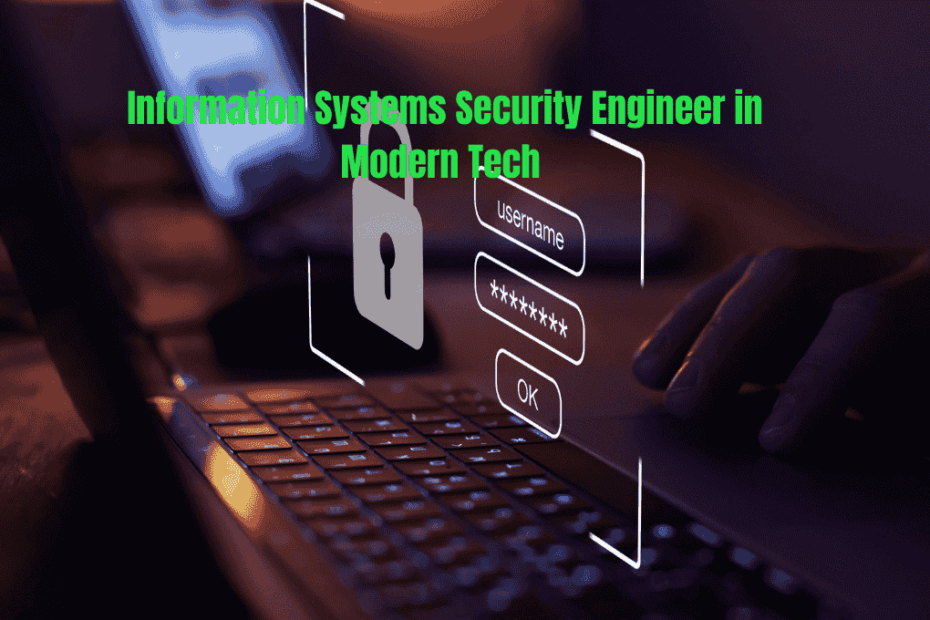Introduction to Information Systems Security Engineering
An Information Systems Security Engineer is responsible for designing and implementing security measures to protect computer systems, networks, and data from potential cyber threats. In a world where digital information is critical, their role is increasingly essential. The field of security engineering covers various areas, including network security, application security, and data protection.
The importance of this role is evident as cyber-attacks become more sophisticated. Security engineers are the gatekeepers who protect sensitive information, such as personal data, intellectual property, and financial details, from unauthorized access and breaches. In modern tech ecosystems, security engineers are integral to both private and public sectors, where they safeguard critical infrastructures, such as banking systems, government databases, and healthcare records.
Key Responsibilities of Information Systems Security Engineers
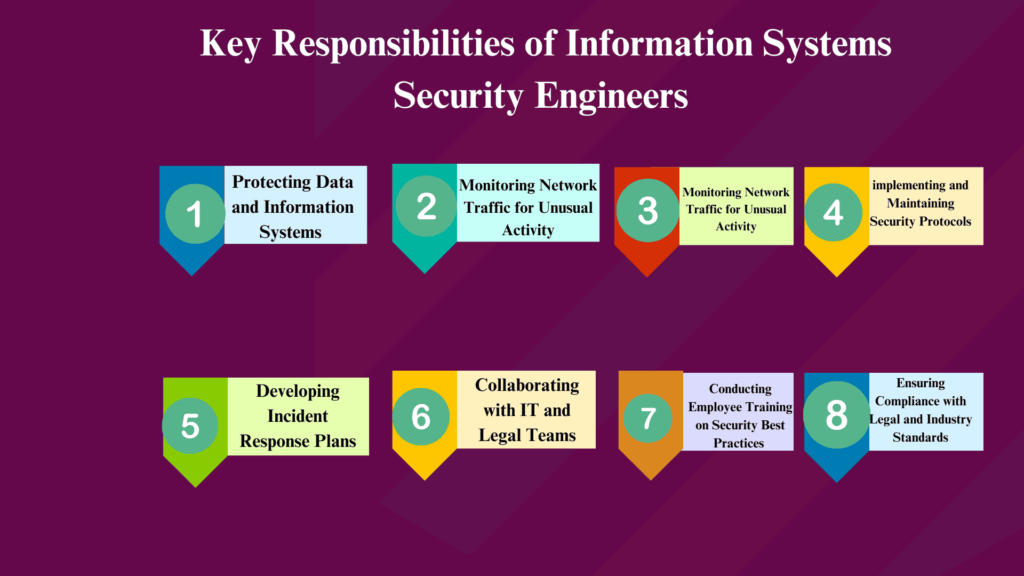
Protecting Data and Information Systems
Security engineers safeguard sensitive data, preventing unauthorized access and breaches. They implement robust encryption techniques and secure data storage solutions. Regular monitoring ensures that information systems remain secure from internal and external threats.
Monitoring Network Traffic for Unusual Activity
Engineers use sophisticated tools to constantly monitor network traffic. They analyze traffic patterns and identify any anomalies that could indicate a cyber-attack. Continuous monitoring helps in early detection and prevention of security incidents.
Performing Regular Security Audits
Conducting regular security audits allows engineers to identify vulnerabilities in the system. Audits ensure that security protocols are up-to-date and effective in mitigating threats. Engineers review access logs, security settings, and compliance with legal requirements.
Implementing and Maintaining Security Protocols
Engineers are responsible for setting up firewalls, encryption methods, and multi-factor authentication (MFA). They ensure these protocols are maintained and updated regularly to stay ahead of potential threats. Security protocols form the backbone of a company’s defense strategy.
Developing Incident Response Plans
Having a well-defined incident response plan is crucial for managing security breaches. Engineers prepare response plans to minimize damage, ensuring quick recovery and continuity of operations. These plans outline steps for detecting, responding to, and recovering from cyber-attacks.
Collaborating with IT and Legal Teams
Security engineers often work closely with IT departments to implement security measures. They also collaborate with legal teams to ensure compliance with data protection laws. This cross-departmental coordination is key to building a strong security posture.
Conducting Employee Training on Security Best Practices
Engineers train employees on recognizing phishing attempts, using strong passwords, and following data protection protocols. Regular training reduces the risk of human error, which is often the weakest link in cybersecurity.
Ensuring Compliance with Legal and Industry Standards
Security engineers must ensure that systems comply with regulations such as GDPR and HIPAA. Compliance involves adhering to industry standards for data protection, encryption, and access controls.
Modern Security Challenges in Information Systems

Rising Cyber Threats
With the increasing complexity of cyber-attacks, engineers face constant challenges. Hackers use more advanced techniques, including ransomware, phishing, and malware, making it difficult to predict and prevent attacks. Engineers need to stay updated on emerging threats to maintain security.
Remote Work and Security Risks
The transition to remote work has created additional security vulnerabilities. Employees working from home often use unsecured networks, which are prime targets for hackers. Engineers must implement secure access methods, such as VPNs, and ensure that remote devices follow security protocols.
BYOD (Bring Your Own Device) Challenges
Many organizations allow employees to use personal devices for work, but this creates security challenges. Personal devices may not have the same level of protection as corporate ones. Engineers must enforce security measures like mobile device management (MDM) to secure data on personal devices.
Insider Threats and Data Misuse
Not all threats come from external sources. Insider threats, whether intentional or accidental, can compromise a system’s security. Engineers need to implement strict access controls and monitor for any suspicious activity from within the organization.
Securing IoT Devices
The increasing use of IoT (Internet of Things) devices creates additional entry points for hackers. Engineers must secure these devices to prevent them from being exploited in attacks. This includes updating firmware, using encryption, and limiting device access to authorized users.
Compliance with New Regulations
New cybersecurity laws and regulations are being enacted globally, and engineers must ensure that their systems comply. Not complying with these regulations may lead to legal repercussions. Regular audits help maintain compliance with evolving legal frameworks.
Securing Multi-Layered Systems
Modern organizations use multi-layered systems with several interconnected platforms, which increases complexity. Engineers need to secure each layer to prevent unauthorized access or breaches. This requires a holistic approach to network and system security.
Dealing with Social Engineering Attacks
Social engineering attacks exploit human psychology to deceive individuals into revealing sensitive or confidential information. Phishing is a common example of this tactic. Engineers must implement both technical solutions and user training to reduce the risk of successful social engineering attacks.
Tools and Technologies Used by Security Engineers
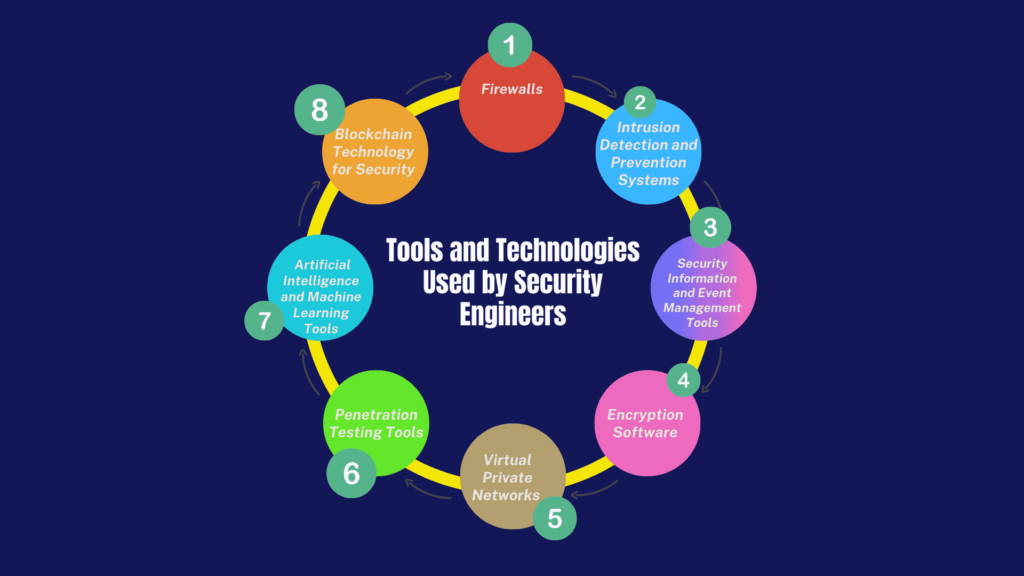
Firewalls
Firewalls create barriers between trusted and untrusted networks, filtering incoming and outgoing traffic. Engineers configure firewalls to block unauthorized access and harmful data. Firewalls are essential for protecting internal systems from external threats.
Intrusion Detection and Prevention Systems (IDS/IPS)
IDS and IPS are used to detect and prevent unauthorized access to networks. These systems monitor network traffic for suspicious behavior and automatically respond to potential threats. Engineers use IDS/IPS to maintain real-time security.
Security Information and Event Management (SIEM) Tools
SIEM tools aggregate and analyze security data from multiple sources, helping engineers detect threats. They provide a comprehensive view of an organization’s security status. SIEM systems enable quick responses to potential security incidents.
Encryption Software
Encryption software ensures that sensitive data remains unreadable to unauthorized users. Engineers use encryption to secure data both in transit and at rest. Strong encryption algorithms protect against data breaches and eavesdropping.
Virtual Private Networks (VPNs)
VPNs secure internet connections by encrypting data and masking IP addresses. Engineers implement VPNs to protect remote workers and secure communications. VPNs are crucial for protecting sensitive data in a remote work environment.
Penetration Testing Tools
Penetration testing tools replicate cyberattacks on a system to uncover potential vulnerabilities. Engineers use these tools to find weaknesses before hackers can exploit them. Penetration testing is a proactive approach to improving system security.
Artificial Intelligence and Machine Learning Tools
AI and machine learning are being used more frequently to identify and address cyber threats. These tools analyze large volumes of data to identify patterns that indicate potential attacks. Engineers leverage AI to enhance threat detection and response capabilities.
Blockchain Technology for Security
Blockchain offers a decentralized and immutable way to store data, making it harder for hackers to alter information. Engineers are exploring how blockchain can be used to enhance security, particularly for transactions and identity verification.
Skills Required for Information Systems Security Engineers
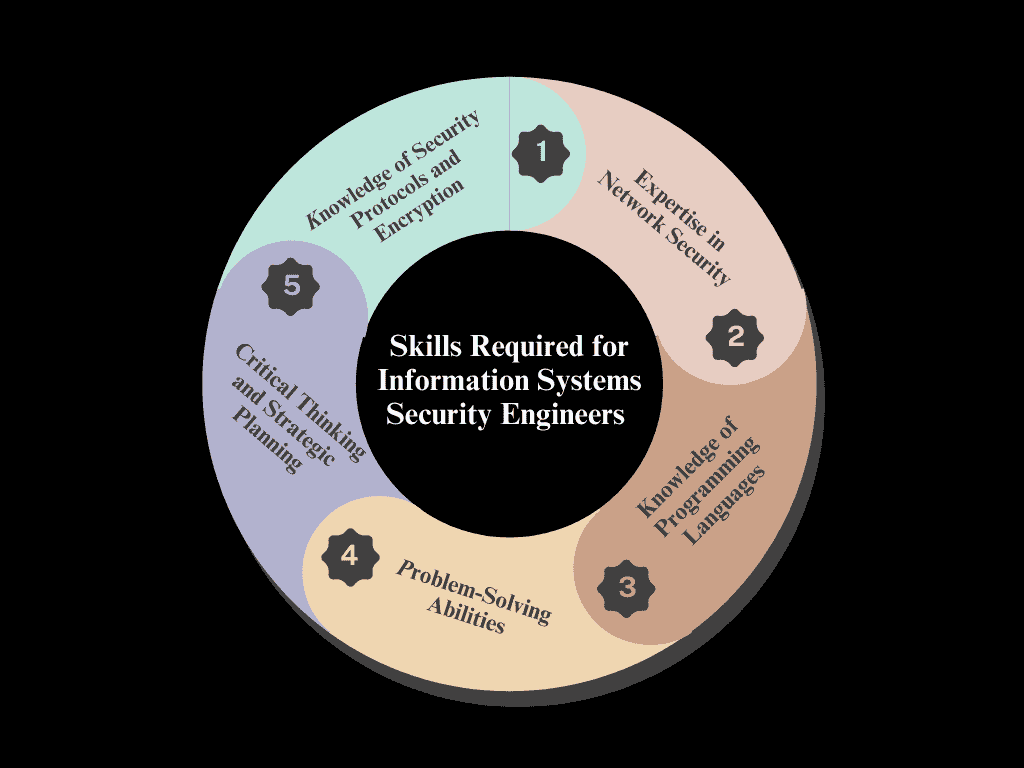
Expertise in Network Security
Security engineers must have deep knowledge of network infrastructure and security protocols. They need to understand how to secure networks from unauthorized access and protect sensitive data. Engineers must constantly monitor network activity for potential breaches.
Knowledge of Programming Languages
Engineers use programming languages like Python, Java, and C++ to develop security scripts and automate processes. Knowledge of programming enables engineers to write custom solutions and analyze security threats. Scripting is essential for automating routine security tasks.
Problem-Solving Abilities
When security incidents occur, engineers must think quickly to identify and resolve the issue. Problem-solving skills are crucial for diagnosing vulnerabilities and finding solutions that prevent future attacks. Engineers often work under pressure during incidents, requiring a calm, analytical approach.
Critical Thinking and Strategic Planning
Security engineers must anticipate future threats and plan proactive measures to mitigate risks. Critical thinking enables them to evaluate security measures and improve them. Strategic planning involves developing long-term security protocols that align with organizational goals.
Knowledge of Security Protocols and Encryption
Engineers must be familiar with various security protocols, such as SSL/TLS, and encryption techniques. These skills are essential for implementing security measures that protect data and systems. Engineers must also stay updated on new protocols and encryption methods.
The Role of Information Systems Security Engineers in Cloud Security
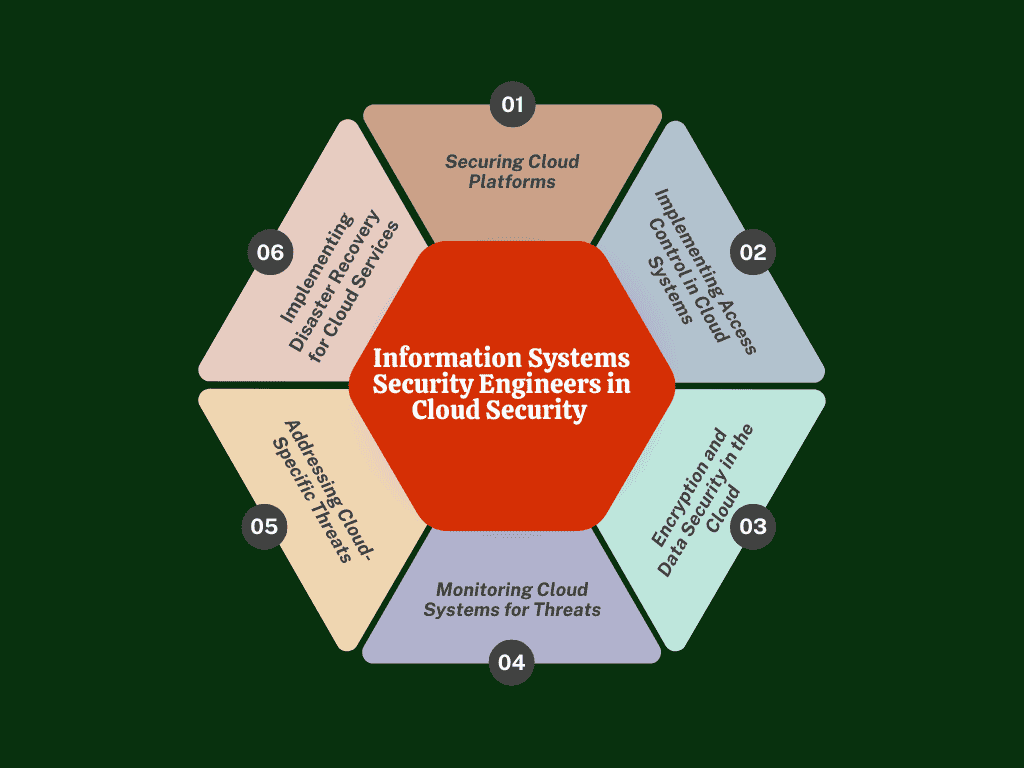
Securing Cloud Platforms
Engineers are responsible for securing cloud infrastructure such as AWS, Azure, and Google Cloud. They configure firewalls, encryption, and access controls to protect data. Monitoring for vulnerabilities in cloud environments is crucial to maintaining security.
Implementing Access Control in Cloud Systems
Cloud environments require strict access controls to prevent unauthorized users from accessing sensitive data. Engineers set up role-based access control (RBAC) systems to manage permissions. Limiting access to necessary personnel reduces the risk of insider threats.
Encryption and Data Security in the Cloud
Cloud data needs to be encrypted during transmission and while stored. Engineers implement encryption solutions to protect cloud-stored data from unauthorized access. They also ensure that encryption keys are managed securely to prevent loss or misuse.
Monitoring Cloud Systems for Threats
Engineers use specialized tools to monitor cloud environments for unusual activity. Any suspicious behavior is flagged for investigation. Monitoring ensures that cloud systems remain secure and that potential breaches are detected early.
Addressing Cloud-Specific Threats
Cloud environments are susceptible to threats like data misconfigurations and insider access. Engineers must identify and address these unique risks to maintain a secure cloud infrastructure. Regular audits of cloud settings help prevent security breaches.
Implementing Disaster Recovery for Cloud Services
Engineers develop disaster recovery plans that allow cloud systems to recover quickly from security incidents. These plans include backups, failover systems, and incident response protocols. Ensuring data is recoverable is critical to maintaining business continuity.
Legal and Ethical Responsibilities of Security Engineers
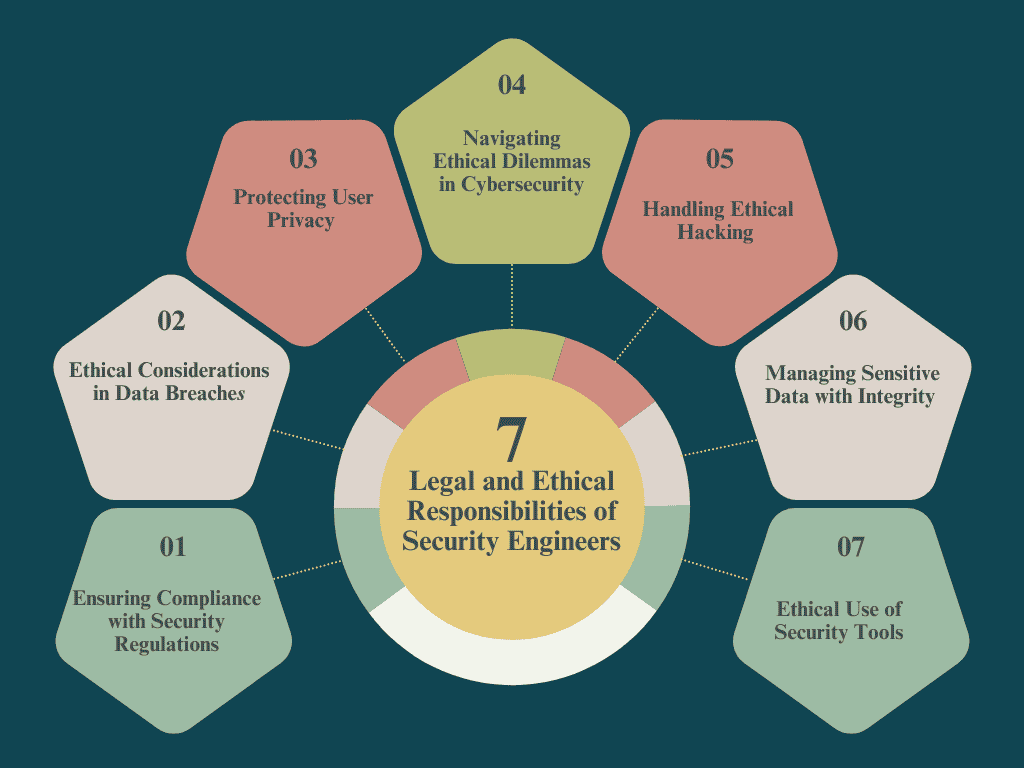
Ensuring Compliance with Security Regulations
Engineers are responsible for ensuring that their organizations comply with data protection regulations such as GDPR, HIPAA, and PCI-DSS. Non-compliance can result in heavy fines and damage to the organization’s reputation. Security engineers must stay informed about changing laws.
Ethical Considerations in Data Breaches
When a data breach occurs, engineers must act quickly and ethically. Transparency is key—engineers need to report breaches promptly and work to mitigate the damage. Ethical decisions in cybersecurity often involve balancing the company’s interests with public safety.
Protecting User Privacy
Engineers have a duty to protect the privacy of users by implementing strong data protection measures. Ensuring that personal data is only accessed by authorized individuals is critical. Engineers must also ensure that user data is stored securely and is not misused.
Navigating Ethical Dilemmas in Cybersecurity
Security engineers often face ethical dilemmas, such as whether to inform users of vulnerabilities that the company may not want disclosed. Engineers must weigh the consequences of their actions and make decisions that uphold ethical standards.
Handling Ethical Hacking (Penetration Testing)
Ethical hacking, or penetration testing, involves testing systems for vulnerabilities with the intent of fixing them. Engineers must ensure that penetration tests are done ethically and legally. The goal is to identify security weaknesses before malicious hackers exploit them.
Managing Sensitive Data with Integrity
Engineers handle highly sensitive data, and it’s their responsibility to ensure that this data is protected from misuse. Data integrity means that the data is accurate and has not been altered. Engineers must implement measures that ensure the integrity of all sensitive information.
Ethical Use of Security Tools
Engineers have access to powerful security tools that can monitor and control data and network traffic. It’s important that these tools are used ethically, respecting privacy and legal boundaries. Misuse of security tools can lead to significant ethical and legal issues.
Trends for Information Systems Security Engineers Future
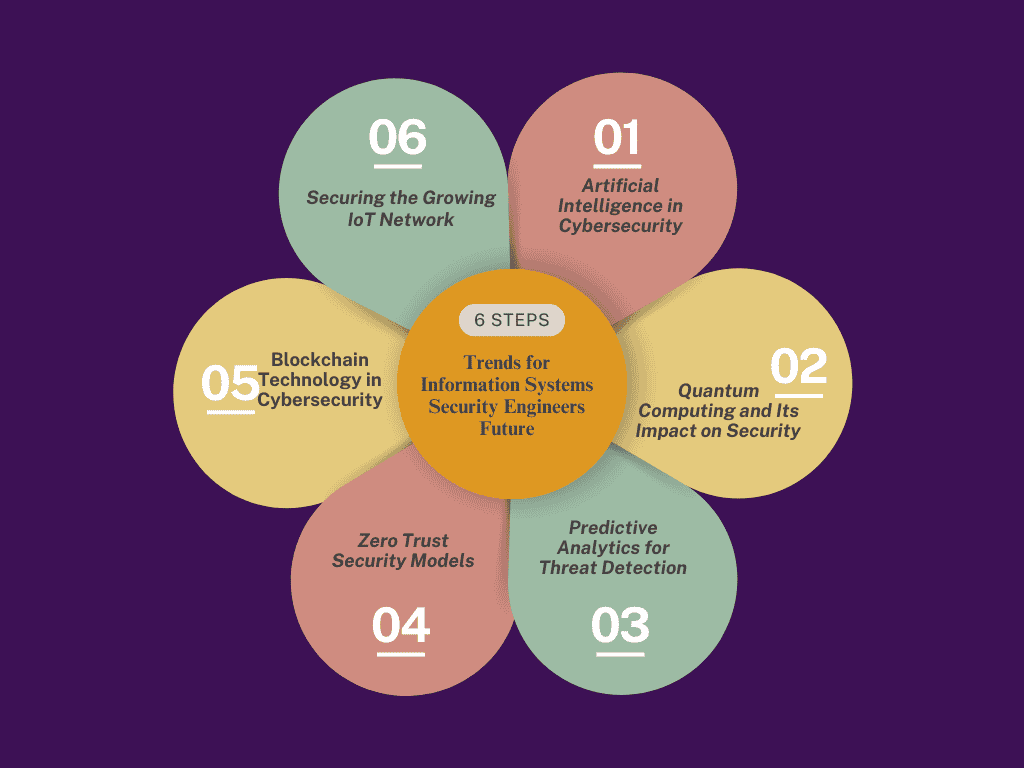
Artificial Intelligence in Cybersecurity
AI is transforming cybersecurity by enabling faster threat detection and response. AI tools can analyze vast amounts of data in real-time, identifying patterns that indicate cyber-attacks. Engineers are increasingly relying on AI to enhance security measures and automate responses.
Quantum Computing and Its Impact on Security
Quantum computing poses a major threat to current encryption methods. As quantum technology advances, engineers must develop new security protocols that can withstand quantum-based attacks. Quantum computers could break current encryption standards, making sensitive data vulnerable.
Predictive Analytics for Threat Detection
Predictive analytics uses historical data to forecast potential security threats. Engineers can use these insights to implement proactive security measures. Predictive analytics helps organizations stay ahead of emerging threats, improving overall security preparedness.
Zero Trust Security Models
The Zero Trust model assumes that no one, whether inside or outside the organization, should be trusted by default. Engineers implement continuous verification of users and devices to ensure that access is granted based on the current security posture.
Blockchain Technology in Cybersecurity
Blockchain technology is being explored as a solution for securing digital identities and protecting data. Its decentralized nature makes it difficult for hackers to alter information stored on a blockchain. Engineers are looking into how blockchain can be integrated into cybersecurity frameworks.
Securing the Growing IoT Network
With the rapid expansion of IoT devices, engineers face new challenges in securing interconnected networks. Every IoT device serves as a possible access point for hackers. Engineers must develop scalable solutions that secure the entire IoT ecosystem while maintaining ease of use.
FAQs
What is Information Security?
Information Security protects all types of information, including digital and physical data. Its focus is on maintaining confidentiality, integrity, and availability. This includes protecting both online and offline information.
What does Cybersecurity focus on?
Cybersecurity focuses on safeguarding digital systems, networks, and data from threats. It addresses threats like hacking, malware, and unauthorized access. Its primary goal is to secure online assets.
How does Information Security differ in scope from Cybersecurity?
Information Security covers both digital and non-digital data, including physical documents. Cybersecurity focuses exclusively on protecting electronic information and systems. This makes Information Security broader in scope.
What common threats are handled by Cybersecurity?
Cybersecurity deals with digital threats such as malware, ransomware, and phishing. These attacks aim to compromise systems or steal data. It focuses on preventing online attacks.
What measures are used in Information Security?
Information Security employs firewalls, encryption, and access controls. Physical measures, like locks and surveillance, also protect non-digital assets. These combined approaches ensure comprehensive protection.
Conclusion
In conclusion, Information Systems Security Engineers are essential to the protection of digital infrastructures in today’s technology-driven world. They are the frontline defenders against cyber threats, ensuring that systems remain secure and resilient. As technology continues to evolve, so too will the role of security engineers. Their expertise will be crucial in safeguarding sensitive information, ensuring compliance with legal regulations, and protecting businesses from the ever-growing threat of cybercrime.
As the digital landscape expands, the demand for skilled security engineers will only increase, making it a rewarding and impactful career choice for those interested in technology and security
